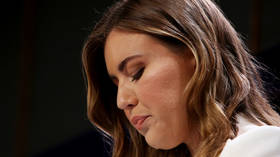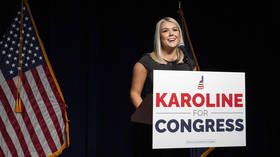This MeToo saga is wrecking journalism, politics, and the legal system in Australia

In Greek mythology Heracles (Hercules in Latin) was tasked with cleaning out the Augean stables in a single day.
Augeas was a Greek king who owned large herds of animals that resided in his palatial stables. They produced extraordinary amounts of dung, and the stables had not been cleaned for years.
Heracles completed his allotted task in a day – but King Augeas refused to pay him. Heracles killed the king, and went into exile.
The Brittany Higgins #MeToo case in Australia still awaits its Heracles – in the meantime, the prodigious pile of dung that it has generated grows exponentially higher by the day.
The sordid saga is Australia’s most infamous #MeToo case. It has dominated the mass media, the legal system, and politics in this country for the past few years – both causing and revealing corruption within each of these areas of Australian public life.
It has destroyed the reputations and careers of prominent journalists, politicians, judges, and lawyers – whilst at the same time transforming both its protagonists, Brittany Higgins and Bruce Lehrmann, into, at the end of the day, rather grubby and flawed celebrities.
It commenced in March 2019, when two drunk, unknown twenty-something political staffers – Higgins and Lehrmann – decided to go back to Parliament House in Canberra after a regular Saturday night of excessive drinking at nearby bars.
Parliament House had long been a favored after-hours sexual trysting location for young political staffers, but both Higgins and Lehrmann have subsequently maintained, unconvincingly, that this was not their intent.
Higgins claimed that Lehrmann raped her in a minister’s office (that of Senator Linda Reynolds, for whom they worked) to which they had improperly gained access, while Lehrmann has steadfastly denied that any sex, consensual or otherwise, took place.
On Monday, in the Federal Court in Sydney, Justice Michael Lee handed down his judgment in defamation proceedings brought by Lehrmann against Channel 10 and television personality Lisa Wilkinson – who broadcast the sensational television interview in early 2021 in which Higgins first publicly alleged that Lehrmann had raped her in Parliament House.
Justice Lee, one of the few lawyers involved in the Higgins saga to have acted with complete propriety and objectivity, made damning findings about both Higgins and Lehrmann – describing them as “unreliable witnesses” who had told deliberate lies – and found that Channel 10 and Wilkinson had acted unreasonably and in a “grossly improper and unjustifiable way.”
Justice Lee’s assessment of the credibility of all the major protagonists in the Higgins saga is undoubtedly correct.
Notwithstanding this uniformly negative appraisal, Justice Lee found – on the civil, balance of probabilities, onus of proof – that Lehrmann had raped Higgins in 2019, because he had been reckless as to whether the inebriated Higgins had consented to having sex with him.
Lee was at pains to point out that this finding differed from a finding of guilt in a criminal trial – where the more onerous “beyond reasonable doubt” onus of proof applies. It is also clear that if Lehrmann had admitted to having sex with Higgins, he would have been in a better position to defend his conduct.
In making this crucial factual finding, Justice Lee disbelieved the accounts given by both Higgins and Lehrmann of what had occurred on the night in question. In particular, he rejected Higgins’ evidence that she had repeatedly told Lehrmann that she did not consent to having sex with her.
It followed that Justice Lee entered judgment in favor of Channel 10 and Wilkinson – because their truth defense had been made out. Lehrmann will no doubt appeal the decision – given that the legal costs of all parties probably exceed $5 million.
The defamation trial presided over by Justice Lee revealed in graphic terms the unprofessional and unprincipled conduct engaged in by those media organizations that became involved in the Higgins affair in a partisan fashion.
Lisa Wilkinson’s interview with Higgins in February 2021 – which turned Higgins into a #MeToo icon – was hardly an exercise in journalism at all. Wilkinson was committed to the #MeToo cause and to bringing down the conservative Morrison government, and Justice Lee found that Higgins’ allegations were not tested at all – especially her now demonstrably false assertion that the government conspired to cover up her rape.
Wilkinson’s slanted interview unsurprisingly later won a prestigious award, and in her televised acceptance speech in June 2022 she reiterated the truth of Higgins’ allegations – thereby causing Lehrmann’s upcoming criminal trial for rape in the ACT Supreme Court to be postponed, and making it difficult, if not impossible, for him to receive a fair trial before a jury.
Justice Lee found that no reputable journalist could have believed that Wilkinson’s speech did not amount to a contempt of court.
And, at one point in her cross-examination, Wilkinson – who Justice Lee described ironically as a “fourth estate eminence grise” – accused Lehrmann’s lawyer of “making me sound like a tabloid journalist” – a comment that provoked laughter from serious journalists.
Wilkinson fell out with Channel 10 as a result of the aftermath of her speech, and she has not appeared on television for the past few years. Justice Lee’s scathing and apt criticisms of Wilkinson will probably ensure that her “journalistic” career will not be revived anytime soon.
After Lehrmann’s rape trial was aborted as a result of misconduct by a juror, Lehrmann agreed to give a tell-all television interview to the Channel 7 ‘Spotlight’ program, which was broadcast in June 2023.
This was hardly surprising – both Higgins and Lehrmann are addicted to the celebrity culture that created them and continues to sustain them in their quest for perpetual celebrity status.
Lehrmann’s ‘Spotlight’ interview was just as self-serving and flawed as Higgins’ interview with Wilkinson had been – perhaps even more so because Lehrmann is the more determined liar – and his defamation trial revealed squalid details about the lengths to which Channel 7 was willing to go to procure it.
Bear in mind that Justice Lee found that Lehrmann was “a fundamentally dishonest liar” who “gave false evidence about a litany of matters.”
Evidence presented at the trial showed that Channel 7 paid the rent on an expensive apartment for Lehrmann for over 12 months, as well as paying for meals at fashionable restaurants and numerous interstate trips.
More sensationally, a former Channel 7 employee who acted as Lehrmann’s “minder” on the ‘Spotlight’ program testified that Channel 7 paid $10,000 for “Asian massages” for Lehrmann, as well as reimbursing him for cocaine that he purchased.
The “minder” also testified that Lehrmann supplied Channel 7 with confidential documents obtained during his criminal proceedings – thereby committing a contempt of court. Justice Lee found that this allegation was made out. Both the “minder” and producer of ‘Spotlight’ recently departed Channel 7.
So much for what the Higgins saga tells us about contemporary investigative journalism in Australia.
The story has had an even more destructive impact on the legal system in Australia, particularly in the Australian Capital Territory – the nation’s capital.
After Wilkinson delivered her infamous televised speech, and after Prime Minister Scott Morrison delivered his apology to Higgins in federal parliament in early 2022 – in which he implicitly accepted that she had been raped – it was virtually impossible for Lehrmann to receive a fair trial before a jury in his criminal rape case.
Nevertheless, the Lehrmann criminal matter went to trial in the ACT Supreme Court in late 2022.
During her cross-examination at the trial, Higgins was granted the extraordinary indulgence of not having to appear for some days – even though no application by her was made in open court. And when the jury was unable to reach a verdict after some days’ deliberation, it was not discharged, as many lawyers thought it should have been.
By chance, a court official discovered that a juror had improperly accessed material from the internet – in clear breach of the trial judge’s repeated directions, and the trial was aborted.
Of course, the fact that modern jurors pay no heed to judge’s directions gives lie to the proposition that adverse pre-trial publicity can be cured by an appropriate direction by the trial judge.
After the rape trial had been aborted, Higgins delivered an inflammatory speech on the court steps condemning the legal system and Lehrmann. This speech constituted a clear contempt of court, but no action was taken against Higgins – just as no action had been taken against Lisa Wilkinson for her speech earlier in the year.
A subsequent enquiry reluctantly established by the woke Labor/Greens ACT government into the Lehrmann trial – presided over by a well-respected former judge from Queensland – made serious findings of misconduct (including that he had not acted with fairness and detachment and had lied to the judge presiding over Lehrmann’s rape trial) against the ACT Director of Public Prosecutions, Shane Drumgold, who had prosecuted Lehrmann at trial.
Drumgold was forced to resign, and notwithstanding the serious findings of misconduct made against him by the enquiry, Drumgold has now found employment as a lecturer in law at a Canberra university.
And the ACT government recently gave Senator Reynolds $90,000 and an apology to settle a defamation action she had brought in respect of Drumgold’s conduct.
Not surprisingly, the reputation of the ACT legal system amongst those who believe in due process and the rule of law is at an all-time low – and quite deservedly so. It is difficult to see how it can ever recover.
Lehrmann’s flawed prosecution for rape has also led a few courageous judges in New South Wales – including one particularly brave female judge – to publicly raise questions about the influence of the #MeToo movement on the Office of the NSW Director of Public Prosecutions.
These judges believe that “meritless” cases alleging rape are regularly being prosecuted for essentially ideological reasons – and they are sick and tired of presiding over extremely weak cases with no reasonable prospects of success, that juries quickly throw out. These judges have taken the unusual step of ordering the government to pay the successful defendants’ legal costs in such cases.
The Higgins saga’s effect on politics has been equally dire.
Mention has already been made of Prime Minister Morrison’s extraordinary apology to Brittany Higgins made in federal parliament in February 2022.
Given that it was inevitable that the Higgins matter would wind up before the courts, it was grossly improper for Morrison to express a view on what might have occurred in Parliament House three years earlier. He was completely unaware of the facts at the time, and his apology was a pathetic attempt to curry political favor with the #MeToo movement.
Morrison’s crude ploy failed completely, and Higgins became a trenchant critic of the prime minister and subsequently campaigned against him. The Morrison government was voted out of office in early 2023 – with its “woman problem” said to be a major contributing factor to its demise.
Morrison also disloyally failed to support Senator Reynolds over the Higgins matter – he simply threw her under the #MeToo bus, in order to try and save himself and his government from being voted out of office. Reynolds has now, understandably, resigned from parliament in disgust – yet another female victim of the Higgins saga.
After winning the federal election in early 2023, the Labor government of Anthony Albanese settled a foreshadowed legal claim by Higgins against the Morrison government and Senator Reynolds for the staggering sum of $2.3 million – at a mediation that lasted less than a day.
It is now apparent that many of the allegations made by Higgins in that foreshadowed claim were never properly tested, and may well be demonstrably false. Justice Lee expressed doubts the settlement in his judgment.
Higgins and her boyfriend were friendly with a number of female Labor politicians who had eagerly taken up her cause in 2022, and serious questions have recently been raised about the propriety of this unprecedented settlement.
The National Anti-Corruption Commission – ironically established by Albanese last year – is currently considering whether to conduct an enquiry into Higgins’ settlement.
Higgins used part of her settlement monies to recently purchase a chateau in France, where she now resides with her boyfriend – who bears a disturbing resemblance to Bruce Lehrmann. Australian taxpayers are decidedly unimpressed.
The Higgins saga is, however, far from ended.
Last year, Lehrmann was charged with raping a woman after meeting her at a Toowoomba striptease club. That trial will take place later this year or early next year, and will no doubt ensure that Lehrmann retains his celebrity status for the foreseeable future.
Senator Reynolds has also sued Higgins and her boyfriend for defamation, and that case will come on for trial later this year in Perth.
If the National Anti- Corruption Commission decides to investigate Higgins’ remarkable $2.3 million payout – as it should – that enquiry may also take place later this year.
It is now beyond argument that the Higgins saga has seriously corrupted journalism, the legal system and politics in Australia, perhaps beyond hope of redemption, because – as Justice Lee pointed out in his judgment – the Higgins “shambles” has always been “a proxy for broader cultural and political conflicts.”
A few judges and journalists of integrity – no politician would dare criticize the #MeToo movement – have taken a principled public stand, but they comprise a very small, if courageous, minority.
No doubt the #MeToo movement will fixate upon the fact the Justice Lee found that, on the civil onus of proof, Higgins was raped and blithely ignore his serious criticisms of her and those media organizations that uncritically published her false allegations.
As the Higgins tsunami continues to wreak havoc into the future, one can only wonder what appalling additional disclosures it will reveal and how much more Australian taxpayers will have to pay for it.
Only one thing is certain – cleaning up all this filth is beyond even Heracles.
The statements, views and opinions expressed in this column are solely those of the author and do not necessarily represent those of RT.















